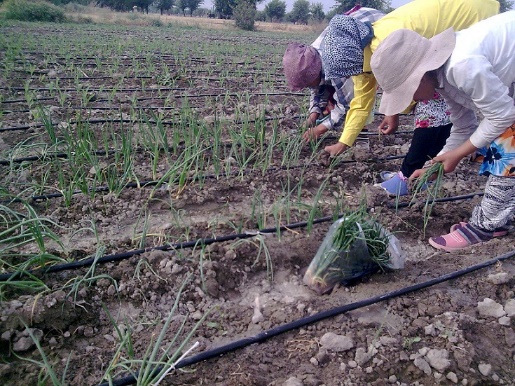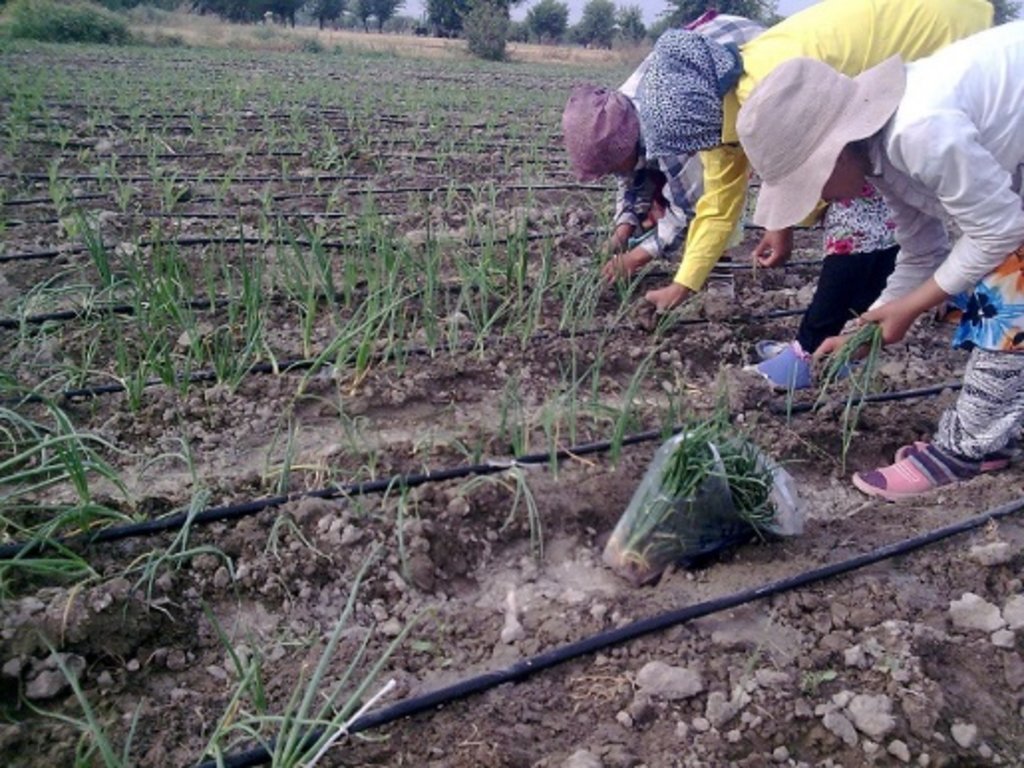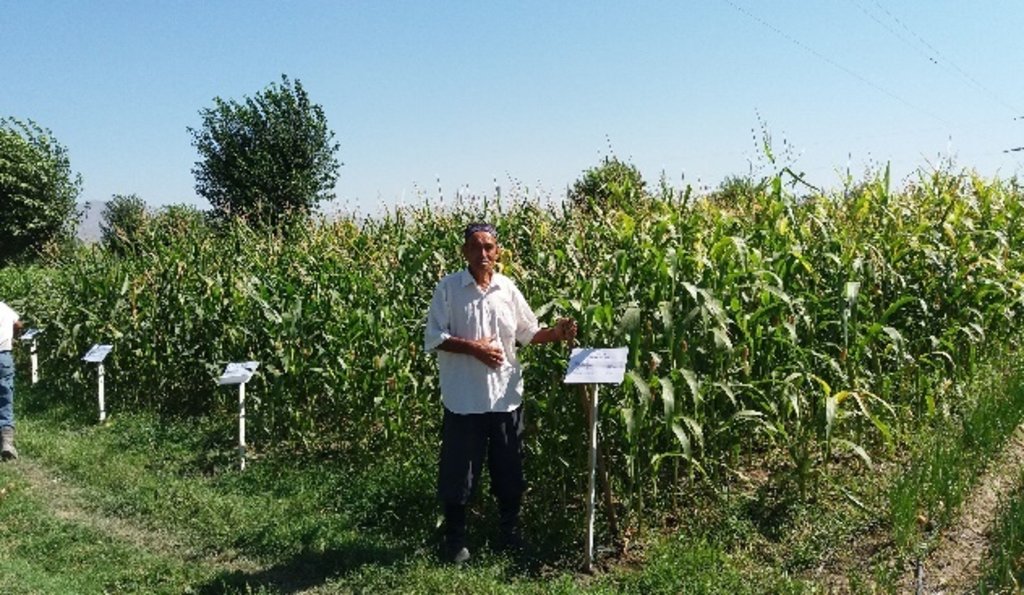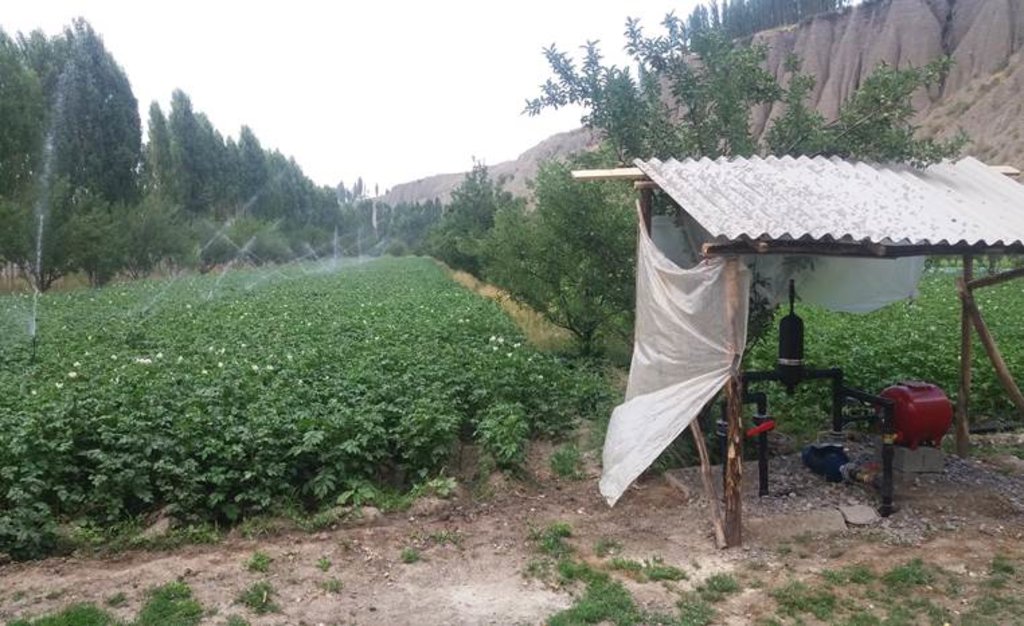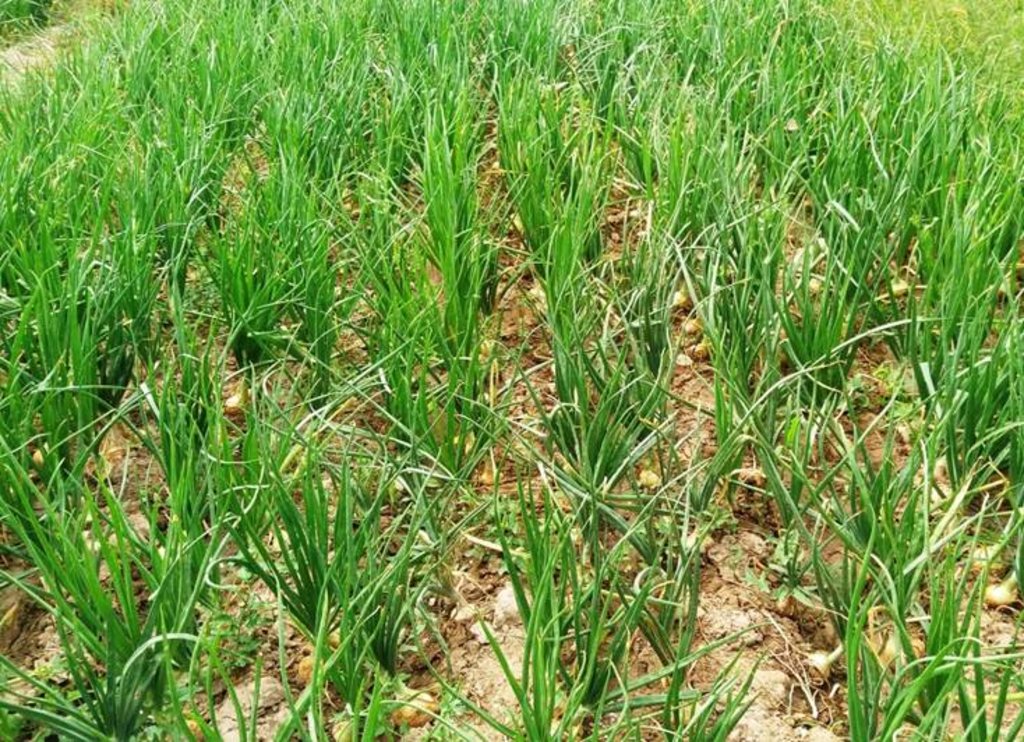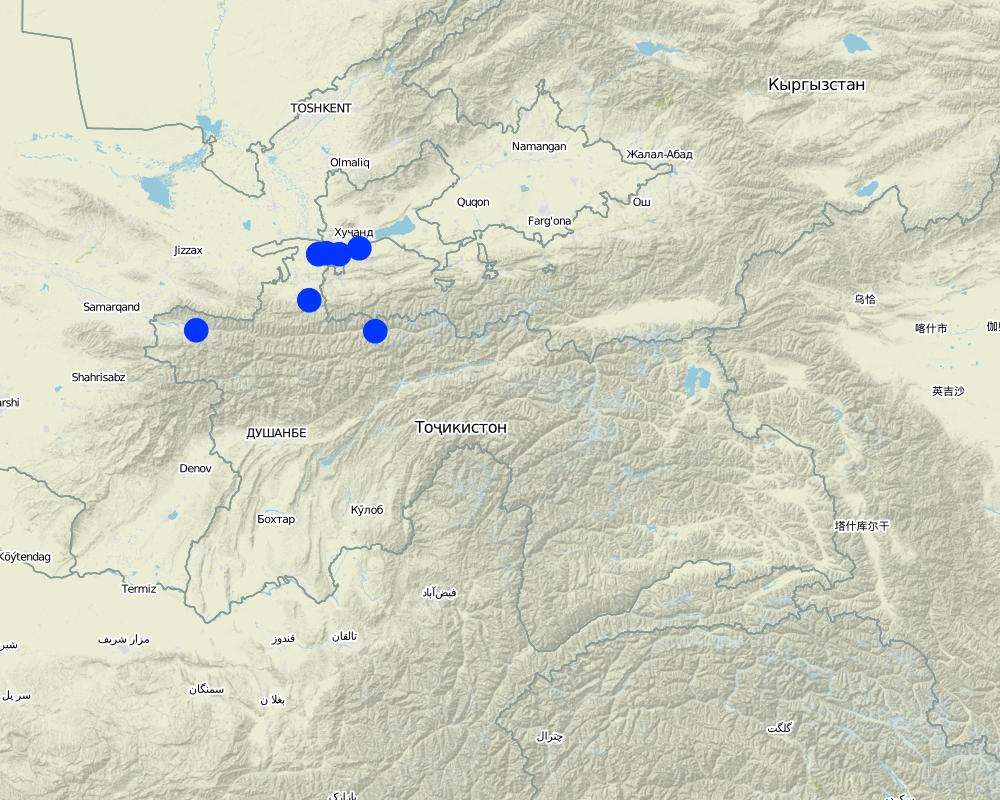Integrated farming on irrigated lands for adaptation to changing climate [Tajiquistão]
- Criação:
- Atualização:
- Compilador/a: Stefan Michel
- Editor: –
- Revisor: Umed Vahobov
Интегрированное ведение земледелия на орошаемых землях для адаптации к изменению климата
approaches_4316 - Tajiquistão
Veja as seções
Expandir tudo Recolher tudo1. Informação geral
1.2 Detalhes do contato das pessoas capacitadas e instituições envolvidas na avaliação e documentação da abordagem
Pessoa(s) capacitada(s)
Especialista em GST:
Negmatov Negmatjon
negmatdzhon.negmatov@giz.de
Deutsche Gesellschaft für Internationale Zusammenarbeit (GIZ)
Tajiquistão
Nome do projeto que facilitou a documentação/avaliação da Abordagem (se relevante)
Strengthening of Livelihoods through Climate Change Adaptation in Kyrgyzstan and TajikistanNome da(s) instituição(ões) que facilitou(ram) a documentação/avaliação da Abordagem (se relevante)
GIZ Tajikistan (GIZ Tajikistan) - Tajiquistão1.3 Condições em relação ao uso da informação documentada através de WOCAT
Quando os dados foram compilados (no campo)?
29/11/2018
O/a compilador/a e a(s) pessoa(s) capacitada(s) aceitam as condições relativas ao uso de dados documentados através da WOCAT:
Sim
1.4 Referência ao(s) questionário(s) sobre tecnologias da GST
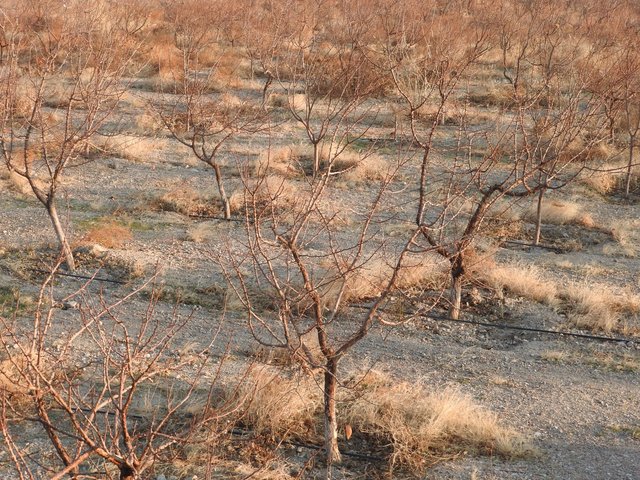
Applying drip irrigation for efficient irrigation water use … [Tajiquistão]
Drip irrigation substantially saves water compared to conventional furrow irrigation. Here the technology is applied for different perennial and annual crops and with use of different sources of water.
- Compilador/a: Stefan Michel
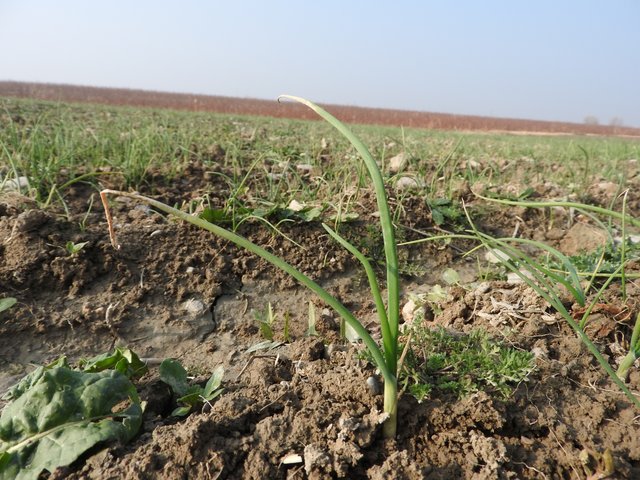
Onion production by greenhouse propagation and transplantation [Tajiquistão]
Onion seeds are sown in sheeting greenhouses, where the onion seedlings are propagated. The seedlings are then replanted in the open field. This makes them less prone to extreme weather events and provides higher yield of better quality.
- Compilador/a: Stefan Michel
2. Descrição da abordagem de GST
2.1 Descrição curta da abordagem
Irrigated agriculture faces challenges from climate change impact and growing competition for irrigation water. The approach to get "more crop per drop" reduces the adverse effect of these impacts and improves the income of farmers.
2.2 Descrição detalhada da abordagem
Descrição detalhada da abordagem:
Irrigated cultivation of onion, potatoes, corn and other crops is hampered by poor agricultural practice and these challenges are increasingly exacerbated by the impact of climate change. The already visible trends and predictions show higher levels of aridity, higher temperatures during the vegetation season, reduced overall precipitation in catchment areas, more irregular rainfall patterns, reduced snow packs and accelerated snow melt as well as the loss of glaciers as buffers of water flow. These factors all cause a reduction of available irrigation water, while higher temperatures and expansion of irrigated agriculture – partly also caused by increasing aridity and reduced feasibility of rain-fed farming – lead to higher irrigation water demand. At the same time irrigated agriculture has low irrigation water use efficiency in terms of yield, crop quality and created income.
Other problems in irrigated cultivation of onion, potatoes, corn and other crops are caused by poor agricultural practice. Crop varieties producing high yield of good quality under the local conditions are not available for local farmers. Insufficient knowledge about the use of agrochemicals, difficult access to these and financial shortages experienced by farmers during the time of planting and growing of crops cause the inadequate application of fertilizer and pesticides and cause crop losses and quality issues. Only wealthy farmers are able to purchase timely sufficient amounts of agricultural inputs. Most farmers apply insufficient amounts and inadequate combinations of fertilizers, thus causing a declining soil fertility, which affects quantity and quality of harvested crops. Unreliable harvest amounts and inconsistent quality reduce the marketability of the agricultural products and cause low income levels of farmers, again affecting their ability to work their lands effectively and sustainable. Additionally, a policy of “one village – one product” has contributed to higher risks in cases of crop failure or production exceeding demand.
The approach aims at reducing these risks and obstacles in an integrated way under consideration of ongoing trends and predicted impacts of climate change. The approach therefore combines several elements through an agricultural extension service:
•Agricultural extension service providing tailored assistance to the farmers;
•Provision of agricultural inputs through the extension services to ease the application of technical advice and reduce transaction costs for the farmers;
•Packages of agricultural inputs include seeds/planting material, fertilizers and pesticides as well as growth regulator with the instruction for their correct use;
•The agricultural extension service provides access to crop varieties, which are adapted to the local site conditions and produce reliable high yields of best quality;
•Agricultural inputs are provided to farmers on a part loan basis by the extension service: farmers pay 50% of the costs of the package when purchasing, the remaining 50% are paid after harvest, with a zero interest rate (the extension service buys the inputs at bulk price and sells them to the farmers at retail price, which is 115% of the bulk price);
•Technological assistance includes the use of seeding machines and cultivation technology like the transplanting of pre-grown seedlings of onion or rice;
•Farmers are advised to diversify their crops in accordance to the local site conditions and market demand.
Additionally the project has assisted with testing and demonstration of different irrigation technologies, e.g. drip irrigation in various crops and sprinkler irrigation in potato cultivation. The result of these trials are used by the agricultural extension service to advise farmers under what site conditions, costs of irrigation water and other inputs, expected yields and predicted market demand the application of such costly irrigation techniques can be economically reasonable.
2.3 Fotos da abordagem
2.5 País/região/locais onde a abordagem foi aplicada
País:
Tajiquistão
Região/Estado/Província:
Sughd region
Especificação adicional de localização:
B. Gafurov, J. Rasulov, Spitamen, Devashtich and Panjakent districts
Map
×2.6 Datas de início e término da abordagem
Caso o ano exato seja desconhecido, indique a data aproximada de início da abordagem:
menos de 10 anos atrás (recentemente)
2.7 Tipo de abordagem
- Baseado em projeto/programa
2.8 Principais metas/objetivos da abordagem
Improved agricultural productivity in terms of yields and quality under conditions of climate change.
2.9 Condição que propiciam ou inibem a implementação de tecnologia/tecnologias aplicada(s) segundo a abordagem
Disponibilidade/acesso a recursos e serviços financeiros
- Inibitivo
Farmers have difficulties to afford agricultural inputs at the beginning of the growth season. This issue is addressed in the approach through part loans.
Quadro institucional
- Propício
Agricultural extension service collaborates with GIZ and was ready to jointly develop and adopt the approach.
3. Participação e papel das partes interessadas envolvidas
3.1 Partes interessadas envolvidas na abordagem e seus papéis
- Usuários de terra/comunidades locais
Farmers
Applying the approach on their lands.
- Especialistas em GST/ consultor agrícola
Agricultural experts
Providing technical advice.
- Organização não governamental
NGO Neksigol
Agricultural extension service - advisory role.
- Setor privado
Neksigol Group of Companies
Provider of agricultural inputs.
- Governo local
Agricultural department of Devashtich district, Agricultural departments of other districts
Interested in improvement of agricultural production and resulting well-being of the local population and economic prosperity of their districts. Political backing and support, provision of information, facilitation of contacts.
- Organização internacional
Deutsche Gesellschaft für Internationale Zusammenarbeit (GIZ)
Implementation of the project on behalf of the German government.
Caso várias partes interessadas foram envolvidas, indique a agência líder:
Deutsche Gesellschaft für Internationale Zusammenarbeit (GIZ)
3.2 Envolvimento do usuários de terra/comunidades locais nas diferentes fases da abordagem
| Envolvimento do usuários de terra/comunidades locais | Especifique quem estava envolvido e descreva as atividades | |
|---|---|---|
| Iniciação/motivação | Participativo | Discussion of testing of elements of the approach on their lands |
| Planejamento | Participativo | Discussion of testing of elements of the approach on their lands |
| Implementação | Participativo | Applying elements of the appraoch on their lands |
| Monitoramento/avaliação | Participativo | Recording of yield and crop quality, reporting experiences in applying the elements of the approach. |
3.4 Decisão sobre a seleção de tecnologia/tecnologias de GST
Especifique quem decidiu sobre a seleção de tecnologia/tecnologias a serem implementadas:
- Principalmente especialistas em GST, após consulta com usuários da terra
Especifique em que base foram tomadas as decisões:
- Avaliação de conhecimento bem documentado de GST (tomada de decisão baseada em evidências)
- Resultados de pesquisa
- Experiência pessoal e opiniões (não documentado)
4. Suporte técnico, reforço das capacidades e gestão do conhecimento
4.1 Reforço das capacidades/ formação
Foi oferecida formação aos usuários da terra/outras partes interessadas?
Sim
Especifique quem foi capacitado:
- Usuários de terra
Tipo de formação:
- Áreas de demonstração
- Cursos
4.2 Serviço de consultoria
Os usuários de terra têm acesso a um serviço de consultoria?
Sim
Especifique se foi oferecido serviço de consultoria:
- nas áreas dos usuários da terra
- Em centros permanentes
4.3 Fortalecimento da instituição (desenvolvimento organizacional)
As instituições foram fortalecidas ou estabelecidas através da abordagem?
- Sim, pouco
Especifique a que nível (níveis) as instituições foram fortalecidas ou estabelecidas:
- Local
Descreva instituição, papéis e responsabilidades, membros, etc.
Agricultural extension service and provider of agricultural inputs expanded their fields of work and their reach of farmers.
Especifique o tipo de apoio:
- Financeiro
- Reforço das capacidades/ formação
4.4 Monitoramento e avaliação
Monitoramento e avaliação são partes da abordagem?
Sim
Comentários:
Documentation of yields and quality of harvest, recording of inputs.
Caso afirmativo, esta documentação é destinada a ser utilizada para monitoramento e avaliação?
Não
4.5 Pesquisa
A pesquisa foi parte da abordagem?
Não
5. Financiamento e apoio material externo
5.1 Orçamento anual para o componente de GST da abordagem
Caso o orçamento exato seja desconhecido, indique a faixa:
- 10.000-100.000
Comentários (p. ex. principais fontes de recursos/principais doadores):
Government of Germany, implemented via Deutsche Gesellschaft für Internationale Zusammenarbeit (GIZ). The approach has been implemented in the frame of a much larger program and the specific budget for the SLM component of the Approach cannot be determined.
5.2 Apoio financeiro/material concedido aos usuários da terra
Os usuários da terra receberam apoio financeiro/material para a implementação de tecnologia/tecnologias?
Sim
Caso afirmativo, especifique tipo(s) de apoio, condições e fornecedor(es):
Loan of 50% of the retail price of agricultural input packages, to be recovered after harvest at zero interest rate.
5.3 Subsídios para entradas específicas (incluindo mão-de-obra)
- Agrícola
| Especifique quais entradas foram subsidiadas | Em que medida | Especifique os subsídios |
|---|---|---|
| Sementes | Parcialmente financiado | Loan of 50% of the retail price of agricultural input packages, to be recovered after harvest at zero interest rate. |
| Fertilizantes | Parcialmente financiado | Loan of 50% of the retail price of agricultural input packages, to be recovered after harvest at zero interest rate. |
Se a mão-de-obra pelos usuários da terra foi uma entrada substancial, isso foi:
- Voluntário
Comentários:
Work on their own fields for their own income generation.
5.4 Crédito
Foi concedido crédito segundo a abordagem para atividades de GST?
Sim
Especifique as condições (taxa de juros, reembolso, etc):
Loan of 50% of the retail price of agricultural input packages, to be recovered after harvest at zero interest rate. (The extension service buys the inputs at bulk price and sells them to the farmers at retail price, which is 115% of the bulk price.)
Especifique os fornecedores de crédito:
Agricultural extension service / provider of agricultural inputs.
Especifique os destinatários do crédito:
Farmers
5.5 Outros incentivos ou instrumentos
Foram utilizados outros incentivos ou instrumentos para promover a implementação das tecnologias de GST?
Sim
Caso afirmativo, especifique:
The combination of advisory service, provision of a complete package of inputs and financial support (loan).
6. Análise de impactos e declarações finais
6.1 Impactos da abordagem
A abordagem concedeu autonomia aos usuários locais de terra, melhorou a participação das partes interessadas?
- Não
- Sim, pouco
- Sim, moderadamente
- Sim, significativamente
Participating farmers increased their confidence and status.
A abordagem propiciou a tomada de decisão baseada em evidências?
- Não
- Sim, pouco
- Sim, moderadamente
- Sim, significativamente
The direct link between the quality of agricultural input and practices and resulting yield and crop quality became visible.
A abordagem auxiliou os usuários da terra a implementar e manter as tecnologias de GST?
- Não
- Sim, pouco
- Sim, moderadamente
- Sim, significativamente
The farmers were enabled to apply technical advice from the extension service as agricultural inputs were made easier available and affordable.
A abordagem mobilizou/melhorou o acesso aos recursos financeiros para implementação da GST?
- Não
- Sim, pouco
- Sim, moderadamente
- Sim, significativamente
Farmers were enabled through a part loan to purchase input packages.
A abordagem aprimorou o conhecimento e as capacidades dos usuários da terra para implementar a GST?
- Não
- Sim, pouco
- Sim, moderadamente
- Sim, significativamente
Provision of targeted extension.
A abordagem aprimorou o conhecimento e as capacidades de outras partes interessadas?
- Não
- Sim, pouco
- Sim, moderadamente
- Sim, significativamente
Involved extension service and agricultural departments gained knowledge.
A abordagem construiu/fortaleceu instituições, colaboração entre partes interessadas?
- Não
- Sim, pouco
- Sim, moderadamente
- Sim, significativamente
Existing collaboration between farmers, extension services and agricultural departments consolidated.
A abordagem resultou em segurança alimentar aprimorada/nutrição melhorada?
- Não
- Sim, pouco
- Sim, moderadamente
- Sim, significativamente
Increase in yields and crop quality.
A abordagem melhorou o acesso aos mercados?
- Não
- Sim, pouco
- Sim, moderadamente
- Sim, significativamente
More reliable quantities and quality of crop allow improved market access.
A abordagem resultou em emprego, oportunidades de renda?
- Não
- Sim, pouco
- Sim, moderadamente
- Sim, significativamente
Higher yields and better marketability increase incomes of farmers. Demand for inputs improves business and employment opportunities of provider of inputs.
6.2 Principal motivação dos usuários da terra para implementar a GST
- Produção aumentada
- Lucro (lucrabilidade) aumentado, melhora da relação custo-benefício
6.3 Atividades de sustentabilidade de abordagem
Os usuários da terra podem manter o que foi implementado através da abordagem (sem apoio externo)?
- Incerto
Caso negativo ou incerto, especifique e comente:
Many farmers will not be able to purchase the package of advise and inputs without loan support. Such loans are currently not available from commercial financial institutions at affordable conditions.
6.4 Pontos fortes/vantagens da abordagem
| Pontos fortes/vantagens/oportunidades na visão do usuário da terra |
|---|
| Improved crop production. |
| Pontos fortes/vantagens/oportunidades na visão do/a compilador/a ou de outra pessoa capacitada |
|---|
| Improved crop production. |
| Increased crop per amount of irrigation water. |
| Preservation of soil fertility. |
6.5 Pontos fracos, desvantagens da tecnologia e formas de superá-los
| Pontos fracos/desvantagens/riscos na visão do usuário da terra | Como eles podem ser superados? |
|---|---|
| High costs of inputs can by most farmers only be met with loan, at better conditions than typical commercial loans. | Loans at affordable conditions. |
| Pontos fracos/vantagens/riscos na visão do/a compilador/a ou de outra pessoa capacitada | Como eles podem ser superados? |
|---|---|
| High costs of inputs can by most farmers only be met with loan, at better conditions than typical commercial loans. | Loans at affordable conditions. |
7. Referências e links
7.1 Métodos/fontes de informação
- visitas de campo, pesquisas de campo
- entrevistas com usuários de terras
- entrevistas com especialistas em GST
Links e módulos
Expandir tudo Recolher tudoLinks

Applying drip irrigation for efficient irrigation water use … [Tajiquistão]
Drip irrigation substantially saves water compared to conventional furrow irrigation. Here the technology is applied for different perennial and annual crops and with use of different sources of water.
- Compilador/a: Stefan Michel

Onion production by greenhouse propagation and transplantation [Tajiquistão]
Onion seeds are sown in sheeting greenhouses, where the onion seedlings are propagated. The seedlings are then replanted in the open field. This makes them less prone to extreme weather events and provides higher yield of better quality.
- Compilador/a: Stefan Michel
Módulos
Não há módulos


